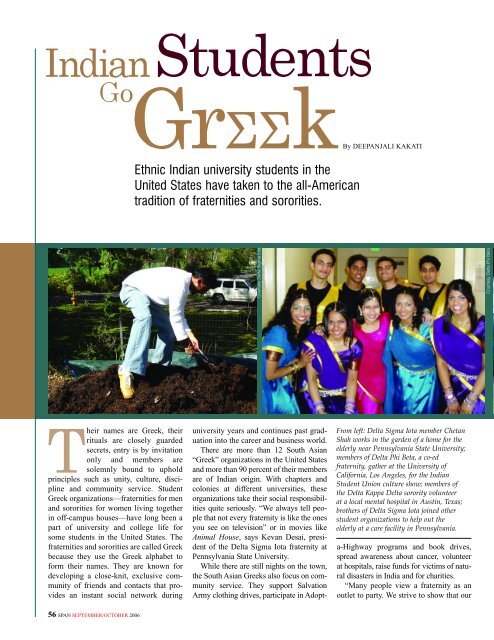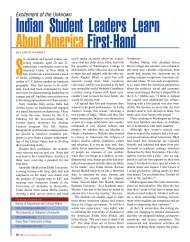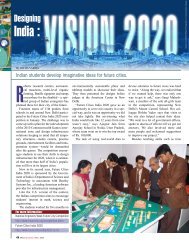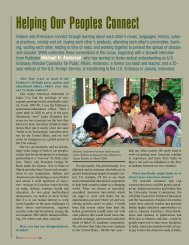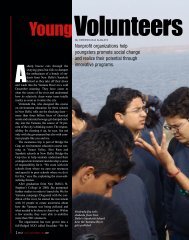Indian Students Go Greek - US Department of State
Indian Students Go Greek - US Department of State
Indian Students Go Greek - US Department of State
You also want an ePaper? Increase the reach of your titles
YUMPU automatically turns print PDFs into web optimized ePapers that Google loves.
heir names are <strong>Greek</strong>, their<br />
rituals are closely guarded<br />
secrets, entry is by invitation<br />
only and members are<br />
solemnly bound to uphold<br />
principles such as unity, culture, discipline<br />
and community service. Student<br />
<strong>Greek</strong> organizations—fraternities for men<br />
and sororities for women living together<br />
in <strong>of</strong>f-campus houses—have long been a<br />
part <strong>of</strong> university and college life for<br />
some students in the United <strong>State</strong>s. The<br />
fraternities and sororities are called <strong>Greek</strong><br />
because they use the <strong>Greek</strong> alphabet to<br />
form their names. They are known for<br />
developing a close-knit, exclusive community<br />
<strong>of</strong> friends and contacts that provides<br />
an instant social network during<br />
56 SPAN SEPTEMBER/OCTOBER 2006<br />
Ethnic <strong>Indian</strong> university students in the<br />
United <strong>State</strong>s have taken to the all-American<br />
tradition <strong>of</strong> fraternities and sororities.<br />
Courtesy Delta Sigma Iota<br />
university years and continues past graduation<br />
into the career and business world.<br />
There are more than 12 South Asian<br />
“<strong>Greek</strong>” organizations in the United <strong>State</strong>s<br />
and more than 90 percent <strong>of</strong> their members<br />
are <strong>of</strong> <strong>Indian</strong> origin. With chapters and<br />
colonies at different universities, these<br />
organizations take their social responsibilities<br />
quite seriously. “We always tell people<br />
that not every fraternity is like the ones<br />
you see on television” or in movies like<br />
Animal House, says Kevan Desai, president<br />
<strong>of</strong> the Delta Sigma Iota fraternity at<br />
Pennsylvania <strong>State</strong> University.<br />
While there are still nights on the town,<br />
the South Asian <strong>Greek</strong>s also focus on community<br />
service. They support Salvation<br />
Army clothing drives, participate in Adopt-<br />
By DEEPANJALI KAKATI<br />
From left: Delta Sigma Iota member Chetan<br />
Shah works in the garden <strong>of</strong> a home for the<br />
elderly near Pennsylvania <strong>State</strong> University;<br />
members <strong>of</strong> Delta Phi Beta, a co-ed<br />
fraternity, gather at the University <strong>of</strong><br />
California, Los Angeles, for the <strong>Indian</strong><br />
Student Union culture show; members <strong>of</strong><br />
the Delta Kappa Delta sorority volunteer<br />
at a local mental hospital in Austin, Texas;<br />
brothers <strong>of</strong> Delta Sigma Iota joined other<br />
student organizations to help out the<br />
elderly at a care facility in Pennsylvania.<br />
a-Highway programs and book drives,<br />
spread awareness about cancer, volunteer<br />
at hospitals, raise funds for victims <strong>of</strong> natural<br />
disasters in India and for charities.<br />
“Many people view a fraternity as an<br />
outlet to party. We strive to show that our<br />
Courtesy Delta Phi Beta
Courtesy Delta Phi Beta<br />
primary focus is the community and betterment<br />
<strong>of</strong> South Asians,” says Anil Nair,<br />
a vice president <strong>of</strong> the Delta Epsilon Psi<br />
fraternity at the University <strong>of</strong> Texas in<br />
Austin. There are <strong>Indian</strong> student organizations<br />
on most campuses, so why have<br />
some chosen to join the <strong>Greek</strong> system?<br />
“In a regular student organization everyone<br />
is not on the same page, whereas in<br />
our fraternity everyone has the same<br />
focus and goals,” says Nair. He adds that<br />
there are pr<strong>of</strong>essionally rewarding opportunities<br />
for new students through the<br />
extensive fraternity and sorority alumni<br />
network.<br />
The first South Asian brotherhood was<br />
formed in 1994 by eight students <strong>of</strong><br />
Binghamton University in New York. Four<br />
years later Kappa Phi Gamma, formed at<br />
the University <strong>of</strong> Texas in Austin, became<br />
the first South Asian interest sorority.<br />
The history <strong>of</strong> <strong>Greek</strong> organizations in the<br />
United <strong>State</strong>s goes back to the 18th century,<br />
when the Phi Beta Kappa Society was<br />
formed in 1776 at the College <strong>of</strong> William<br />
and Mary in Williamsburg, Virginia. Kappa<br />
Alpha Theta (1870) and Kappa Kappa<br />
Gamma (1870) were the first women’s<br />
societies to use <strong>Greek</strong> letters.<br />
In <strong>Greek</strong> organizations, new members<br />
are interviewed, tested and have to prove<br />
their dedication before they are inducted.<br />
“One <strong>of</strong> our policies is to restrict students<br />
from joining who have a grade point average<br />
below a certain level,” says Summit<br />
Walia, national board president <strong>of</strong> the<br />
Beta Kappa Gamma fraternity at the<br />
University <strong>of</strong> Texas in Austin. One <strong>of</strong> the<br />
challenges faced by new recruits, says<br />
Arthi Kodur, a vice president <strong>of</strong> the Delta<br />
Kappa Delta sorority, involves time management:<br />
how to handle schoolwork<br />
while participating in sorority activities.<br />
At the start <strong>of</strong> the school year many<br />
students line up to try out for the organizations<br />
<strong>of</strong> their choice in a season traditionally<br />
called “rushing.” “<strong>Students</strong> gain<br />
a great deal by joining these organizations.<br />
They develop their leadership<br />
skills, perform community service and<br />
increase their knowledge <strong>of</strong> Asian<br />
American communities,” says Ajay T.<br />
Nair, associate director <strong>of</strong> the Asian<br />
American Studies Program at the<br />
University <strong>of</strong> Pennsylvania. Mainstream<br />
American fraternities and sororities are<br />
Courtesy Delta Kappa Delta<br />
beginning to see the value in <strong>Greek</strong><br />
organizations that focus on issues<br />
impacting specific ethnic groups, he<br />
adds. “Many institutions have developed<br />
multicultural <strong>Greek</strong> councils to accommodate<br />
these diverse interest groups.”<br />
Besides, these organizations help new<br />
students adapt to an unfamiliar environment,<br />
get to know more people <strong>of</strong> their<br />
community and work as a team. Shivani<br />
Seth, national executive president <strong>of</strong> the<br />
Sigma Sigma Rho sorority, feels it gives<br />
students <strong>of</strong> her generation a chance to<br />
combine their heritage and American culture.<br />
Delta Phi Beta, the first South Asian<br />
co-ed fraternity, helps members by hosting<br />
résumé-building seminars and quarterly<br />
workshops aimed at specific careers.<br />
The South Asian organizations have<br />
tried to forge their own identity within the<br />
<strong>Greek</strong> system. “They focus less on the<br />
social aspects <strong>of</strong> college life. Most minority<br />
fraternities/sororities have an interest<br />
in increasing political and social awareness<br />
<strong>of</strong> key issues impacting minority<br />
communities,” says Ajay Nair.<br />
Some channel their philanthropy into<br />
special causes. The Chi Psi Beta fraternity<br />
at Texas A&M University provides money<br />
to pay for the education and other needs <strong>of</strong><br />
an 8-year-old orphaned boy in India. To<br />
raise money for the Juvenile Diabetes<br />
Research Foundation, the Delta Epsilon<br />
Psi fraternity brings together 30 student<br />
organizations to compete in a football<br />
tournament called the Sugar-Free Bowl.<br />
Every year the fraternity also hosts a car-<br />
nival, called Project Come Together, with<br />
concerts, games and rides “to reward<br />
Austin’s youth for their hard work in the<br />
classroom.” The sixth carnival this year<br />
attracted 2,500 children. In April—<br />
declared National Child Abuse Prevention<br />
Month by President George W. Bush—all<br />
chapters <strong>of</strong> the Delta Kappa Delta sorority<br />
organized activities to create awareness<br />
about the issue. Proceeds from fundraisers<br />
were sent to CRY, UNICEF and other<br />
organizations in South Asia.<br />
Cultural events are also important. This<br />
year Delta Epsilon Psi’s Festival <strong>of</strong> India<br />
featured Karmacy, an <strong>Indian</strong> American rap<br />
band from California, and Rasika Mathur,<br />
an <strong>Indian</strong> American comedienne. In 2003<br />
Sigma Sigma Rho started an annual <strong>Greek</strong><br />
SPAN SEPTEMBER/OCTOBER 2006 57<br />
Courtesy Delta Sigma Iota<br />
STUDENT LIFE
GREGORY BULL © AP-WWP<br />
Muslim Sorority<br />
In some people’s minds, the<br />
“<strong>Greek</strong> system” <strong>of</strong> American<br />
university sororities and fraternities<br />
is synonymous with partying.<br />
But the system includes a huge variety<br />
<strong>of</strong> organizations, many <strong>of</strong> which<br />
encourage academic excellence and<br />
promote community service. A new<br />
national sorority founded on the<br />
principles <strong>of</strong> Islam seeks to build<br />
itself on that model.<br />
Founded little more than a year<br />
ago, the Gamma Gamma Chi sorority<br />
has dedicated itself to giving<br />
young women the positive aspects<br />
<strong>of</strong> a sorority experience while maintaining<br />
Islamic traditions. While the<br />
group’s core principles are Islamic,<br />
it opens its membership to all<br />
women, Muslim and non-Muslim,<br />
who support its mission.<br />
From left:<br />
Kimberly<br />
Harper,<br />
Imani Abdul-<br />
Haqq, Althia<br />
F. Collins and<br />
Kesha Abdul-<br />
Mateen <strong>of</strong><br />
Gamma<br />
Gamma Chi.<br />
Gamma Gamma Chi is the inspiration<br />
<strong>of</strong> Imani Abdul-Haqq, a young<br />
Muslim woman who was dissatisfied<br />
with the sorority scene at her<br />
university in North Carolina. Instead<br />
<strong>of</strong> dismissing the entire system,<br />
god and goddess pageant—Qayamat—<br />
which brings together six South Asian fraternities<br />
and sororities. For the past two<br />
years proceeds from this event have gone<br />
to the HELP Foundation (Health and<br />
Education for the Less Privileged) in India.<br />
Last year Delta Phi Beta held a cultural<br />
conference with all South Asian organizations<br />
at the University <strong>of</strong> California, Los<br />
Angeles. This was part <strong>of</strong> its effort to be “a<br />
culturally unifying force in the South Asian<br />
58 SPAN SEPTEMBER/OCTOBER 2006<br />
though, Abdul-Haqq decided to<br />
form her own sorority based on<br />
Islamic values. Abdul-Haqq’s mother,<br />
Althia F. Collins, a former college<br />
president and sorority member,<br />
threw herself into the dual role <strong>of</strong><br />
president and executive director.<br />
Since then she has spent more than<br />
$50,000 <strong>of</strong> her own money and time<br />
to launch the sorority.<br />
One <strong>of</strong> the most challenging<br />
tasks for Gamma Gamma Chi has<br />
been raising awareness <strong>of</strong> its mission<br />
on American campuses.<br />
Collins and other supporters have<br />
visited many universities, hosting<br />
informal information sessions.<br />
<strong>Students</strong> dressed in everything from<br />
chadors to jeans and T-shirts have<br />
attended and taken an interest.<br />
A student at the University <strong>of</strong><br />
Kentucky, where a chapter <strong>of</strong> the<br />
sorority is being founded, told<br />
National Public Radio, “This is<br />
exactly what Islam is about.”<br />
Christine Ortiz, a graduate <strong>of</strong> the<br />
Massachusetts Institute <strong>of</strong> Tech-<br />
Opens New Doors for American University Women<br />
nology and Gamma Gamma Chi<br />
board member, noting the important<br />
status <strong>of</strong> sororities at American universities,<br />
told <strong>US</strong>A Today, “It will<br />
give Muslim women a face and a<br />
voice on campus.”<br />
Collins told NPR, “This sorority, I<br />
thought, is an opportunity to help<br />
Muslim women to be able to develop<br />
leadership skills and to help<br />
each other through networking.”<br />
Gamma Gamma Chi makes its<br />
commitment to Islam clear in its<br />
motto: “Striving for the pleasure <strong>of</strong><br />
Allah through sisterhood, scholarship,<br />
leadership and community service.”<br />
Its six goals, or <strong>Go</strong>lden Pillars, include<br />
Islamic awareness, education, support<br />
for the indigent, as well as health,<br />
social and environmental awareness.<br />
Chapters will follow Muslim practices<br />
and observe Islam’s holy days.<br />
Collins says no alcohol will be served<br />
at sorority events and while members<br />
may work together with men on specific<br />
projects, there will be no men at<br />
their social gatherings.<br />
Other students apparently agree<br />
with the leaders <strong>of</strong> Gamma Gamma<br />
Chi that this sorority fills a void<br />
among diverse student organizations<br />
on campus. Young Muslim women<br />
in 20 states have expressed interest<br />
in forming chapters <strong>of</strong> an organization<br />
where they can enjoy the company<br />
<strong>of</strong> women like themselves and<br />
show the best face <strong>of</strong> Islam.<br />
Members <strong>of</strong> other sororities have<br />
also welcomed the new organization.<br />
Some have noted that a number <strong>of</strong><br />
community since our diverse membership<br />
allows us to do so,” says Preethy<br />
Kolachalam, co-chair <strong>of</strong> the UCLA chapter.<br />
Twelve years down the line some<br />
South Asians feel they have been accepted<br />
into the <strong>Greek</strong> system. Vishad Pathak,<br />
vice president <strong>of</strong> the Delta Sigma Iota fraternity,<br />
says the <strong>Greek</strong> community at<br />
Pennsylvania <strong>State</strong> University has taken<br />
their organization more seriously each<br />
year and Summit Walia <strong>of</strong> the Beta Kappa<br />
Courtesy Gamma Gamma Chi<br />
By STEVE HOLGATE<br />
Christian-based sororities have succeeded<br />
using similar models. Susan<br />
West, an administrator with the<br />
University <strong>of</strong> Kentucky, has championed<br />
the establishment <strong>of</strong> a Gamma<br />
Gamma Chi chapter at her campus,<br />
saying that the university welcomes<br />
women <strong>of</strong> all faiths. She told the<br />
Voice <strong>of</strong> America, “I think that GGC<br />
will give women a new opportunity. I<br />
have talked with women who are in<br />
sororities now, and they are excited<br />
to have a new group on campus that<br />
will bring something different to their<br />
sorority community.”<br />
The sorority has already passed<br />
an important milestone, establishing<br />
its first chapter in Atlanta,<br />
Georgia, where it serves women<br />
from a number <strong>of</strong> local universities<br />
and colleges. Chapters are forming<br />
in other American cities. The sorority’s<br />
goal is to establish chapters in<br />
every region <strong>of</strong> the United <strong>State</strong>s.<br />
Collins speaks with confidence<br />
about the prospects for the work she<br />
and her daughter have started. “I<br />
can say how pleased I am with the<br />
interest and enthusiasm we’ve<br />
received,” she says, adding, “Imani,<br />
my daughter, and I are honored that<br />
we could be the ones to give shape<br />
and life to an idea whose time has<br />
clearly come.” <br />
Steve Holgate is a special correspondent<br />
for Washington File, a product <strong>of</strong><br />
the Bureau <strong>of</strong> International Information<br />
Programs, U.S. <strong>Department</strong> <strong>of</strong> <strong>State</strong><br />
(http://usinfo.state.gov).<br />
Gamma fraternity feels people have realized<br />
that they are “interested in making<br />
the <strong>Greek</strong> as well as the surrounding community<br />
stronger.”<br />
Others feel there is more work to do.<br />
“We are still making a name for ourselves<br />
and we are not as prominent as other ethnic-based<br />
organizations. The opportunity<br />
is there and we are progressing every<br />
year,” says Shivani Seth <strong>of</strong> Sigma Sigma<br />
Rho sorority.


